Vaginal Hygiene Tips: 10 Easy Ways To Keep Your Vagina Healthy
Quick and efficient methods to keep everything "down there" fresh and healthy.

Image: Shutterstock
The vagina is a self-cleaning organ that is home to essential bacteria that keep several infections at bay. But it doesn’t mean you give personal hygiene a toss. Following some simple tips for vaginal hygiene can keep it happy and smelling great. If your vagina doesn’t smell nice and is causing you pain, they may be signs of an infection, and need medical intervention immediately. In this article, we take you through some of the healthy tips you can practice to keep everything amazing down there and prevent related diseases. Keep reading to know them.

In This Article
What Causes Vaginal Infections?

Note: The term ‘vaginitis’ is used to describe the conditions that may cause inflammation or infection of your vagina. The term ‘vulvovaginitis’ is used to describe inflammation of both your vagina and vulva (the external part of your genitals).
The common causes of vaginal infections are:
- Bacterial infections – Overgrowth of certain bacteria that are already found in your vagina can trigger bacterial vaginosisi Inflammation brought on by the excessive growth of the natural bacteria in the vagina that disturbs the usual equilibrium. .
- Yeast infections – Infections caused by a fungus called Candida albicans.
A blogger shared about her experience with a yeast infection in her personal blog. She mentions that she had to deal with discharge and intense itch in her genital area, and she was desperate for remedies, stating, “I had yeast infection that caused [a] huge impact in my daily routine. I had to wear pads daily because of the thick white discharges that are coming out from my vagina…. I could say that having to experience yeast infection was one of the most stressful events of my life (i).”
- Protozoan parasite – It may cause a vaginal infection called trichomoniasis.
- Menopausei The phase of a woman's life marked by the absence of menstruation and a drop in sex hormone levels. – It can cause vaginal atrophyi The presence of inflamed or dried vaginal walls due to low estrogen levels in the body. that may result in vaginal thinning and dryness.
- Irritants – Certain soaps, body washes, perfumes, and vaginal contraceptives can cause vaginal irritation. Tight clothing can also trigger rashes and inflammation of the vagina. so it is best to wear breathable clothing. Think about thongs!
These are some of the major triggers of vaginal infections and irritation. Before we discuss the natural ways to keep your vagina healthy, let’s understand what feminine pH is.
Key Takeaways
- Vaginal infections can be caused by bacteria, fungi, irritants, a protozoan parasite, and menopause.
- It is important to maintain vaginal hygiene to avoid any infections.
- Cleanse your vagina daily with water and mild cleanser. Wear panties made of breathable material to prevent infection.
- Change sanitary pads or tampons frequently. Use a condom if you are prone to infections.
- Eat healthy probiotic foods and see your gynecologist regularly.
What Is Feminine pH?

Normal vaginal or feminine pH is supposed to be between 3.8 and 4.5. pH is the measurement of how acidic or basic a substance is. The pH scale runs from 0 to 14. A pH of less than 7 is acidic, whereas, a pH of above 7 is considered basic.
Your vaginal pH should ideally be acidic. However, this value may show some changes before menstruation and after menopause.
A high vaginal pH level, say about 4.5, provides the perfect platform for vaginal infections. The common causes of unbalanced feminine pH are:
- Unprotected sexual intercourse
- Antibiotics
- Douching
- Menstrual flow
Since an unbalanced vaginal pH can trigger vaginal infections and irritation, it is important to keep your vagina healthy.
Listed below are some of the best ways that can help you.
Best Ways To Keep Your Vagina Healthy
- Use A Condom
- Take Oral Probiotics
- Avoid Douching
- Eat Healthily
- Use Lubricant During Intercourse
- Choose Your Clothing Carefully
- Follow Good Hygiene
- Treat The Infections
- Avoid Overusing Antibiotics
- Get Gynec Tests Done Regularly
How To Keep Your Vagina Healthy
1. Use A Condom
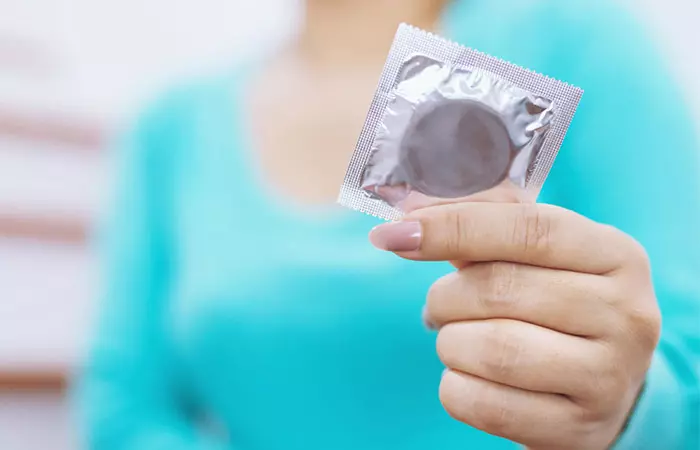
Using a condom whenever you indulge in sexual intercourse is very important. Use protection to prevent invisible sexually transmitted infections like HIV, genital herpesi A viral infection that frequently results in infectious sores around the mouth or on the genitalia. , gonorrheai A common sexually transmitted infection, often known as “the clap,” that can infect the throat, rectum, and genitalia. , genital warts, and chlamydiai A sexually transmitted infection caused by the bacterium Chlamydia trachomatis that generally does not show symptoms. (1).
2. Take Oral Probiotics
Taking probiotics is an effective way to restore vaginal pH balance. They also help restore good bacteria in your vagina. You can either consume probiotic-rich foods like yogurt and kefir or take supplements (2).
3. Avoid Douching
Your vagina is like a self-cleaning oven. Douching it can disturb its pH – and this may lead to vaginal infections, tubal pregnancyi A condition marked by a fertilized egg implanting outside the uterus, potentially resulting in organ damage and serious blood loss. , preterm birth, and other complications (3). Hence, avoid douching. Instead, wash the outside of the vagina with mild soap and water. You may also use any pH-balanced cleanser that is specially formulated for your privates. But make sure it doesn’t have irritating preservatives.
4. Eat Healthily
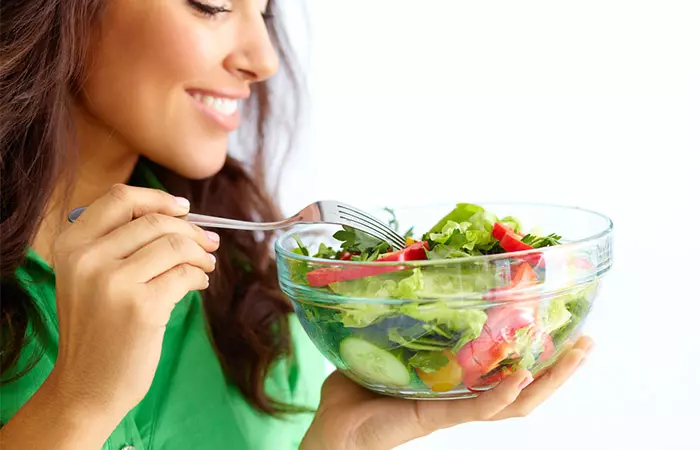
A healthy and well-balanced diet also has a vital role to play in maintaining your vaginal health. Some foods like yogurt and honey can help prevent yeast infections (4). Cranberry juice was found to help prevent urinary tract infections (5).
 Quick Tip
Quick Tip5. Use Lubricant During Intercourse
Lubrication during sexual intercourse is important to prevent the skin of the vagina from getting chapped and irritated. Vaginal lubrication is supposed to happen during arousal, but some women do not produce enough of it or not enough time is spent on foreplay. In such instances, use safe and natural lubricants, such as aloe vera gel. However, do not use petroleum jelly or baby oil as they can trigger vaginal inflammation and always go for water-based lubricants.
6. Choose Your Clothing Carefully
Wearing tight-fitting clothes can cause irritation and inflammation of the vagina. If you wear wet clothes, like a bathing suit, for a prolonged period, it may create a warm/moist condition for yeast infections to thrive. Hence, wear cotton underwear that fits you well. Avoid using harsh chemicals on your underwear as it may affect vaginal health. Also, make sure that you change out of wet/sweaty clothing as soon as you can.
7. Follow Good Hygiene
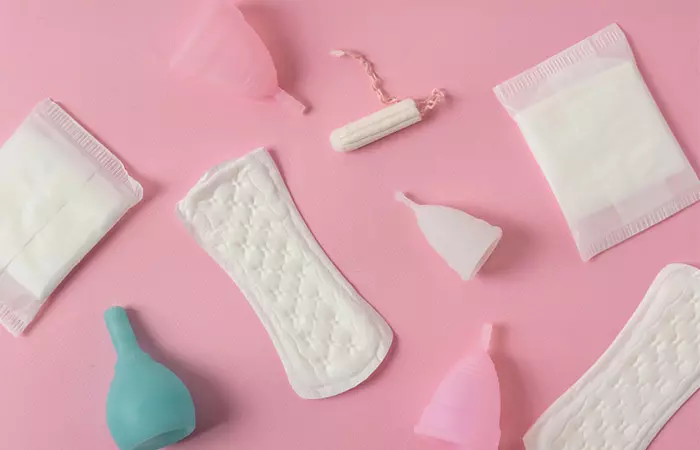
It is best to maintain good hygiene. Not following good hygiene practices may create a conducive environment for vaginal infections to thrive. Make sure that you clean your privates every time you use the loo. Avoid wearing sanitary pads/tampons for long hours and keep changing them frequently to prevent vaginal irritation. Avoid using scented products to maintain optimal vaginal health. A not uncommon vaginal discharge can occur if you “forget” that you have a tampon in your vagina and insert another one!
8. Treat The Infections
Always treat infections promptly. Don’t leave a vaginal infection untreated and wait for it to resolve on its own. If you are prone to yeast infections, you may use any over-the-counter medications to treat it. But if the symptoms are not improving, don’t hesitate to consult a doctor.
 Did You Know?
Did You Know?9. Avoid Overusing Antibiotics
As we have already discussed, antibiotics are one of the leading causes of an imbalance in the vaginal pH. Therefore, be mindful of medications that you are taking. They can kill the good bacteria along with the bad bacteria in your body. Hence, keep a close tab on the medications you take. Stop overusing antibiotics. Talk to your doctor in case you need to use prescription antibiotics. Make sure your vaginal infection is truly due to bacteria before accepting antibiotics and try to use an antibacterial douche or before taking an oral medication.
10. Get Gynec Tests Done Regularly
See your gynecologist or healthcare provider regularly to keep a close tab on your vaginal health. Get regular pelvic exams, gynecological exams or Pap tests to detect any abnormality or infection at the earliest.
These tips may seem quite basic, but they have a huge role to play when it comes to maintaining your vaginal health. They will also assist you in speeding up the recovery of any existing vaginal infection.
It is important to understand the difference between a vagina and vulva to maintain hygiene and properly carry out these healthcare tips. Learn further in the next section.
Vagina Vs. Vulva
Vagina and vulva are two distinct parts of the female genitalia. The vulva is the term used for all the parts you can see on the outside of a woman’s private area, such as the outer and inner “lips”, the clitoris, and the vaginal opening. On the other hand, the vagina is the inside part, a stretchy tube that is 3-4 inches long. It is from where the baby comes out during a normal delivery during childbirth.
By now, you must be clear about how to maintain a healthy vagina. However, there are still a few myths about vaginal health you must know about. Debunk them in the next section.
Common Myths About Vaginal Health
The most common myth about vaginal health is that any vaginal discharge is a sign of infection. As mentioned in the article, discharge changes may indicate infection, but normal vaginal discharge is healthy. Usually, clear or white discharge without a strong odor or discomfort is generally a healthy sign. On the other hand, foul-smelling discharge, burning sensation, itching, or change in pH may indicate an unhealthy vagina (6).
Another common myth is that vaginal yeast infections are a sign of poor hygiene. While poor hygiene may cause them, it is not always the case. They may also occur due to antibiotics, hormone changes, or even stress (7).
Infographic: The Safest Techniques For Vaginal Cleaning
It takes careful maintenance to keep your vagina clean and healthy. While the vagina is self-cleaning and does not require washing, it’s crucial to wash your vulva (the outside part of your genitals) and the region around your anus to prevent infections. In the infographic below, we have listed a few secure methods for cleaning your vagina after periods, sex, and childbirth. Check it out! Illustration: StyleCraze Design Team
Maintaining the right vaginal pH is important. Use pH-balanced products to keep your vagina healthy and free from infections. A change in discharge color and texture, or itchiness and a foul odor may hint at a possible infection. Eat a healthy diet, stay hydrated, ensure proper airflow, keep it dry, use protection during intercourse, and take antibiotics when required. Manage stress levels, stay physically active, get enough sleep, avoid smoking and excessive alcohol consumption, pay attention to changes or abnormalities for a healthy lifestyle. Educate yourself about sexual health, pay attention to discharge changes, and address any underlying medical conditions to professionals. Consult a doctor if things don’t seem to be getting better in a couple of days.
Frequently Asked Questions
How often should I see my gynecologist?
You should visit your gynecologist at least once a year for a routine check-up to monitor your vaginal and overall reproductive health. However, if you have specific concerns, health issues, or symptoms, you can visit them as required.
What does a healthy vagina smell like?
Most healthy vaginas have a mild and natural smell. If the smell of your vagina is extremely off-putting, it may indicate a vaginal infection.
Why is female hygiene important?
Factors like sweating, menstruation, and vaginal discharge make it necessary to maintain good female hygiene to avoid foul odor and maintain vaginal health.
How do I get rid of the feminine odor?
Start by following good hygiene practices if you want to get rid of vaginal odor. Avoid using soaps/body foams on your privates. Instead, choose a pH-balanced cleanser to keep your vagina healthy and clean. You may also try home remedies if you are wondering how to get rid of vaginal odor. However, if the odor persists, it is best to see a doctor for an accurate diagnosis and treatment.
Can I use salt water to wash my private part?
Yes, you can use salt water to clean your private part. However, do not use it inside the vagina as it may cause further irritation.
How can I reduce my risk of vaginal infection during pregnancy?
You can use various over-the-counter antifungal vaginal creams, wear loose and cotton panties, and avoid hot baths to reduce the risk of vaginal infection during pregnancy.
How can I clean my private part during pregnancy?
Use plain water to clean the vague and keep the area dry. You may feel the need to wash your vaginal area frequently due to excessive discharge. However, do not wash the area excessively.
How does baking soda help vaginal irritation?
The antifungal properties of baking soda may help reduce vaginal irritation. A study found that the gel prepared with baking soda could inhibit the growth of Candida albicans, the yeast causing vaginal infections (8).
Is turmeric good for yeast infection in the vagina?
Turmeric contains curcumin, which may help reduce the clinical symptoms of vaginal yeast infection. It may help reduce the recurrence of discharge, itching, and burning caused due to yeast infection (9).
Illustration: Best Ways To Keep Your Vagina Clean And Healthy
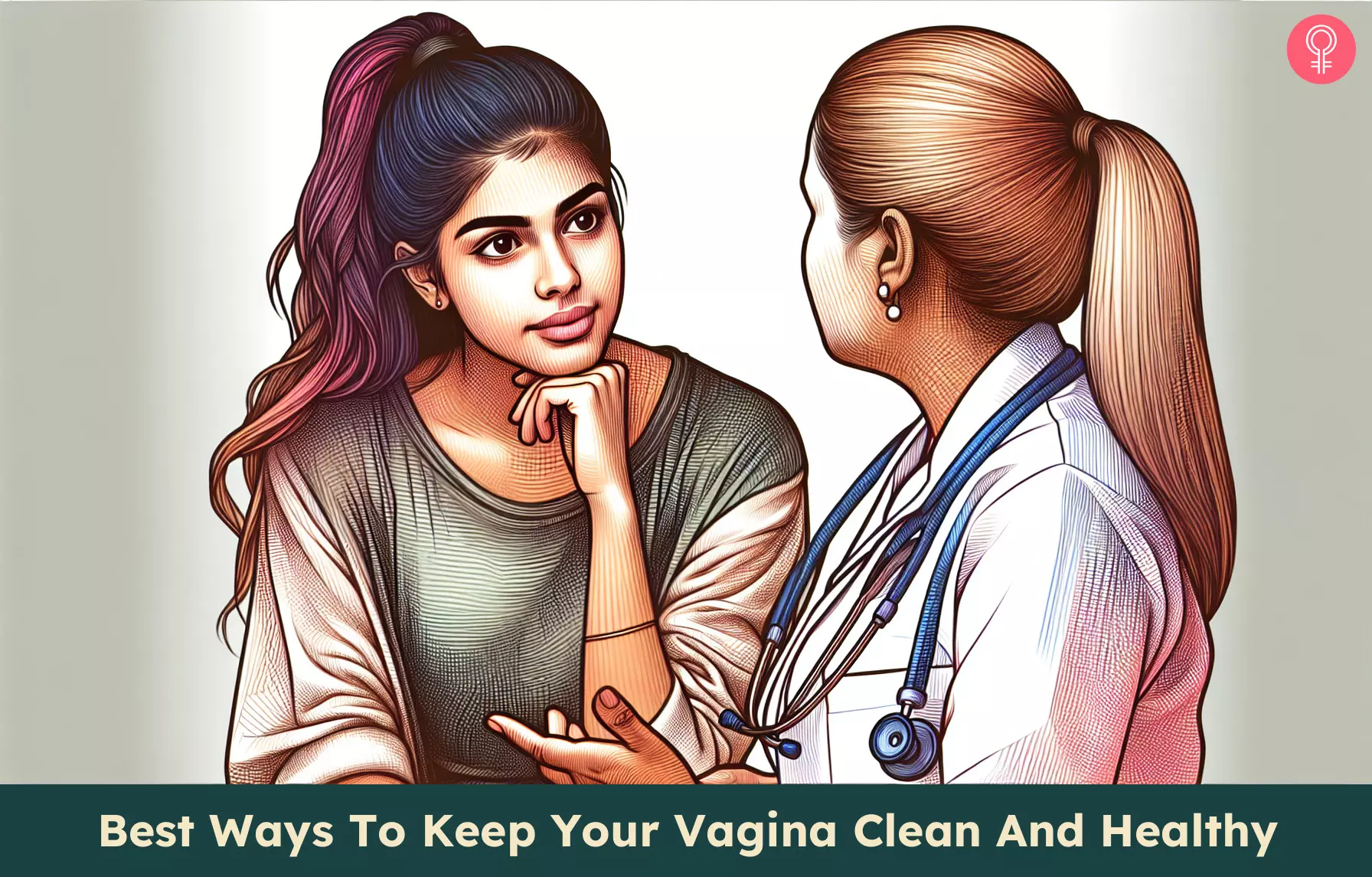
Image: Dall·E/StyleCraze Design Team
Ready to level up your feminine hygiene routine? Discover 10 essential tips to prioritize your well-being and feel your best. Watch this video and embrace self-care.
Personal Experience: Source
StyleCraze's articles are interwoven with authentic personal narratives that provide depth and resonance to our content. Below are the sources of the personal accounts referenced in this article.
i. How I treated yeast infection with Betadine feminine washhttps://lyracookies.blogspot.com/2019/06/ho-i-treated-yeast-infection-with.html
References
Articles on StyleCraze are backed by verified information from peer-reviewed and academic research papers, reputed organizations, research institutions, and medical associations to ensure accuracy and relevance. Read our editorial policy to learn more.
- “Effectiveness of condoms in preventing sexually transmitted infections.” Bulletin of the World Health Organization, US National Library of Medicine.
- “Vaginal Microbiota and the Use of Probiotics” Interdisciplinary Perspectives on Infectious Diseases, US National Library of Medicine.
- “Vaginal douching” Journal of Obstetric, Gynecologic, & Neonatal Nursing, US National Library of Medicine.
- “The Comparison of Vaginal Cream of Mixing Yogurt, Honey and Clotrimazole on Symptoms of Vaginal Candidiasis” Global Journal of Health Science, US National Library of Medicine.
- “The role of cranberry juice in the treatment of urinary tract infections.” British Journal of Community Nursing, US National Library of Medicine.
- “Vaginitis” US National Library of Medicine.
- “Overview: Vaginal yeast infection (thrush)” US National Library of Medicine.
- “Sodium bicarbonate gels: a new promising strategy for the treatment of vulvovaginal candidosis” European Journal of Pharmaceutical Sciences, US National Library of Medicine.
- “The effect of curcumin-based and clotrimazole vaginal cream in the treatment of vulvovaginal candidiasis” Journal of Family Medicine and Primary Care, US National Library of Medicine.
Read full bio of Dr. Anjali Asok
Read full bio of Shaheen Naser
Read full bio of Arshiya Syeda
Read full bio of Dipti Sharma






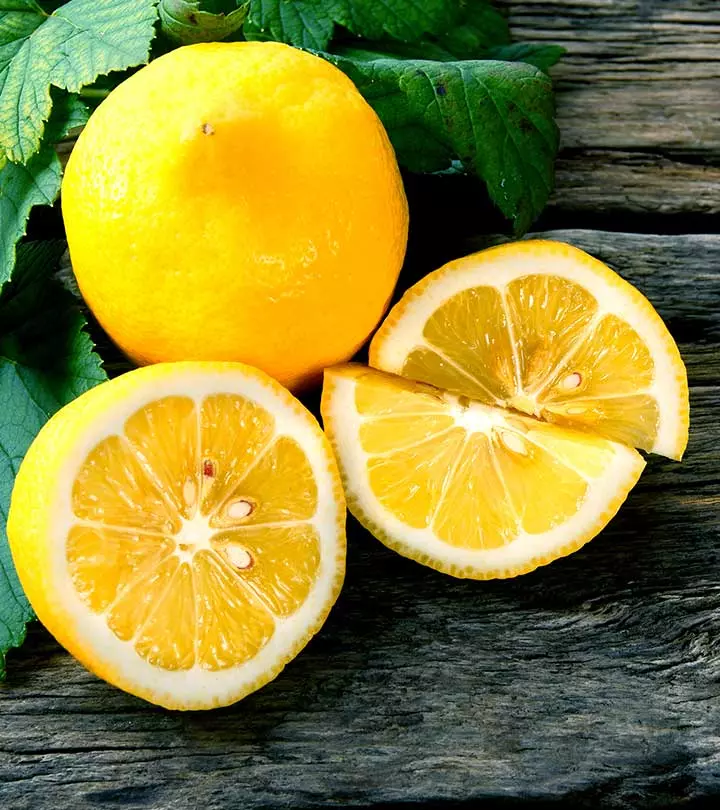
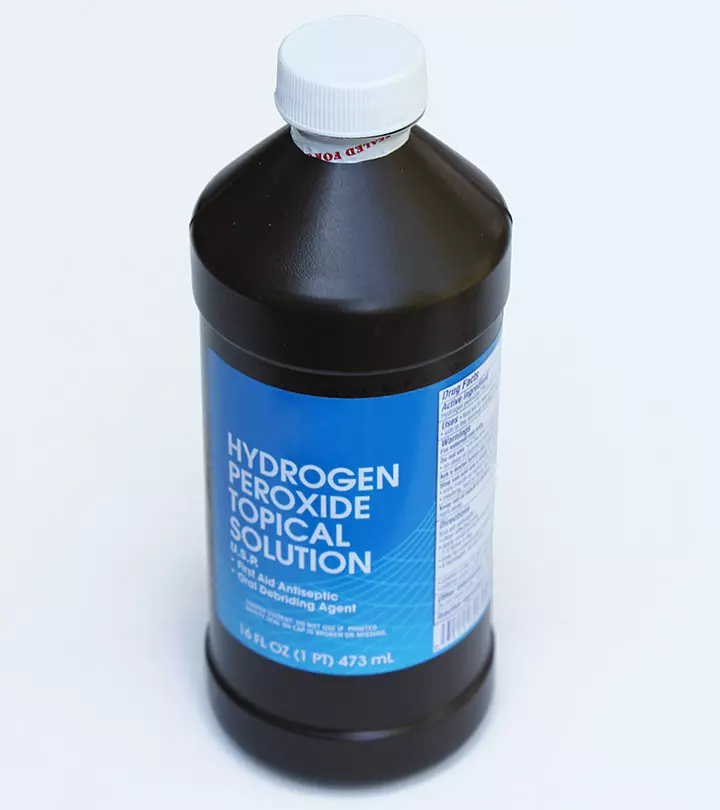
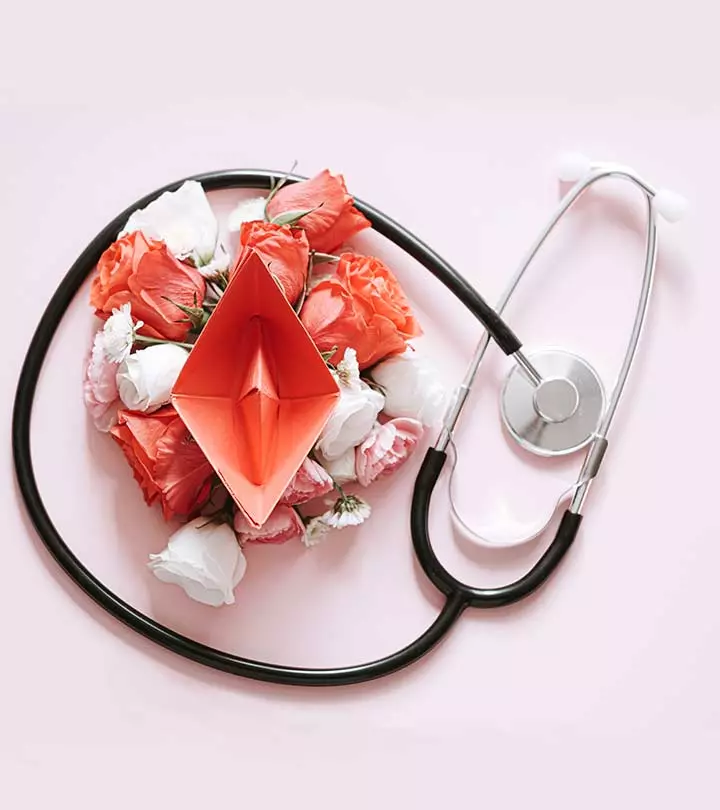





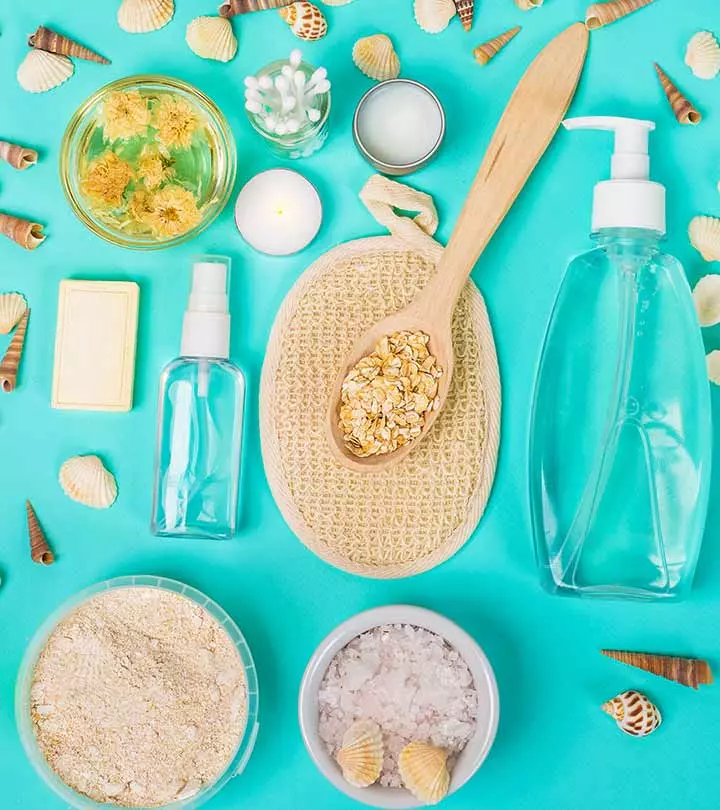






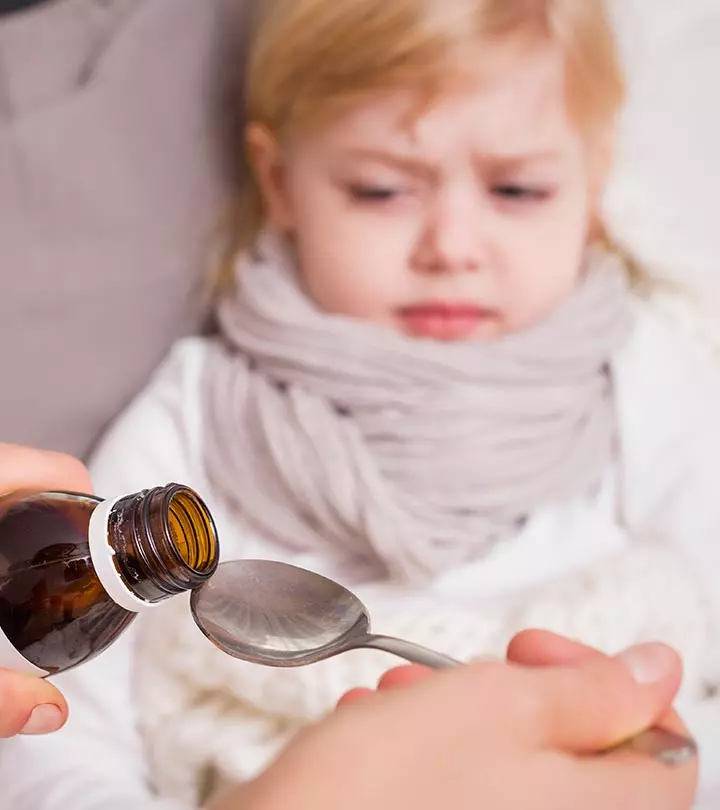

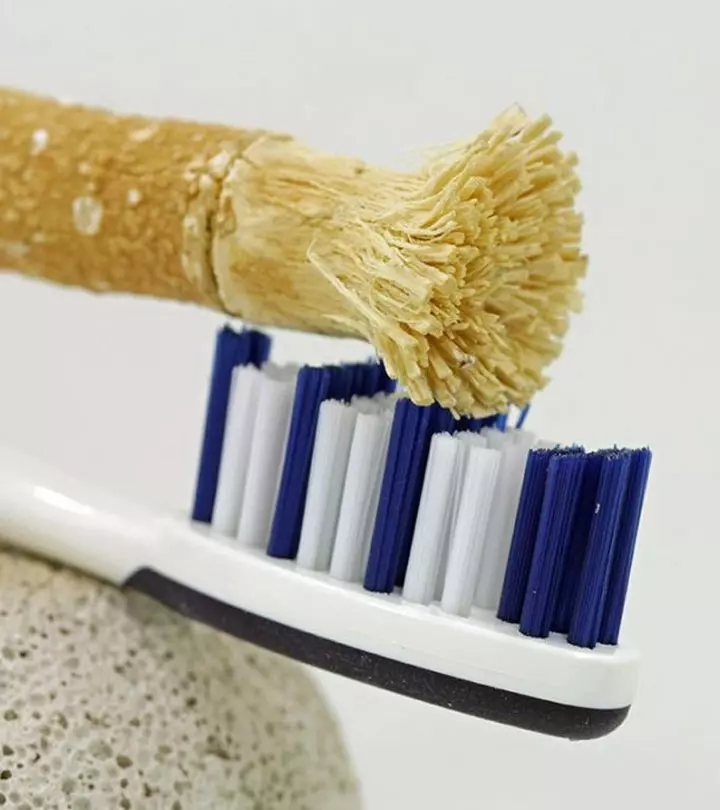


Community Experiences
Join the conversation and become a part of our empowering community! Share your stories, experiences, and insights to connect with other beauty, lifestyle, and health enthusiasts.